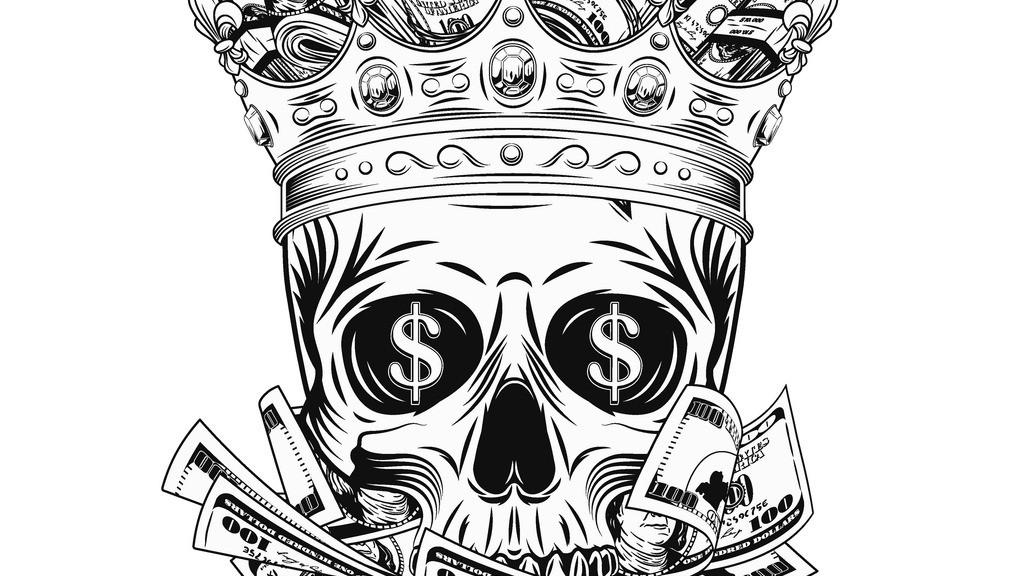“It would have been easy to keep pumping up the economy, borrowing a lot of money, creating a lot of government jobs,” explained Treasury Secretary Bessent to Tucker Carlson, defending the administration’s policies, while describing the extent to which Biden juiced up the US economy, like a body builder on steroids, appearing strong while destroying his internal organs. “There was no controversy when we were doing all that, but you would have ended up in a calamity,” he said. “If you go back and look at the financial crisis in 2007-08, the economy looked great right up until then. You go back to the end of the dotcom bubble, and the whole credit problem, fraud at Enron and some other companies, the economy looked great until it didn’t.”
Overall: “My advice to every country right now is do not retaliate. Sit back, take it in, let’s see how it goes. Because if you retaliate, there will be escalation,” warned Bessent, Treasury Secretary, the Liberation Day shockwave circling the globe. Xi Jinping listened carefully. And seeing America declaring economic war on all its allies and adversaries, along with some uninhabited islands, he mapped out his next move. Weighed the pros and cons, calculated the risk/reward, considered his nation’s ability to endure extreme and prolonged hardship relative to ours, and then blatantly ignored Bessent’s advice, matching Trump’s tariffs and limiting America’s access to critical rare earth metals. “This would be a PERFECT time for Fed Chairman Jerome Powell to cut Interest Rates. He is always “late,” but he could now change his image, and quickly. Energy prices are down, Interest Rates are down, Inflation is down, even Eggs are down 69%, and Jobs are UP, all within two months - A BIG WIN for America. CUT INTEREST RATES, JEROME, AND STOP PLAYING POLITICS!,” posted President Trump on Truth Social, his DJT social media stock price hitting new lows, his meme coin too. “While tariffs are highly likely to generate at least a temporary rise in inflation, it is also possible that the effects could be more persistent,” said Powell. “Our obligation is to keep longer-term inflation expectations well anchored and to make certain that a one-time increase in the price level does not become an ongoing inflation problem,” continued the Fed Chairman. “We are well positioned to wait for greater clarity before considering any adjustments to our policy stance. It is too soon to say what will be the appropriate path for monetary policy,” he added, directly ignoring America’s President. “TO THE MANY INVESTORS COMING INTO THE UNITED STATES AND INVESTING MASSIVE AMOUNTS OF MONEY, MY POLICIES WILL NEVER CHANGE. THIS IS A GREAT TIME TO GET RICH, RICHER THAN EVER BEFORE!!!,” posted Trump, America’s friends and foes all wondering how much damage will be done, how much pain inflicted, wealth destroyed, before his policies will of course change.
Week-in-Review: Mon: US imposes sanctions on six senior Chinese and Hong Kong officials. Marine Le Pen banned from standing for office for five years for embezzlement of EU funds. Le Pen to appeal court ruling. Property sales at Chinese developer Country Garden drop by over a third. Nikkei enters correction territory. US stocks post worst quarter since 2022. Germany CPI 2.2% as exp, US Chicago PMI 47.6 (45.0e), S&P +0.6%. Tue: Taiwan's defense ministry says 71 Chinese military aircraft and 13 Chinese warships operated a military drill around the island. EU brandishes ‘strong plan’ to retaliate against US tariffs. Musk-backed judge loses Wisconsin Federal judge election. French appeals court to rule on Le Pen case by mid-2026. Chinese foreign minister tells Russia Today that Washington must remove ‘unjustified’ levies and engage in equal talks if it wants to resolve the fentanyl issue. USDC stablecoin issuer Circle files for IPO. Chinese megabanks’ profits fall to record low. Italy Unemp rate 5.9% (6.3%e), Eurozone CPI 2.2% as exp / core 2.4% (2.5%e) / PMI mfg 48.6 (48.7e) / Unemp rate 6.1% (6.2%e), US PMI mfg 50.2 (49.9e), US JOLTS job openings 7568k (7658k e), US ISM mfg 49.0 (49.5e), S&P +0.4%. Wed: White House issues reciprocal tariffs in ‘Liberation day’. Tariffs determined based on US trade deficits, not on levels of tariffs and non-tariff barrier imposed by trading partners. 10% baseline tariffs start April 5, higher tariffs begin April 9. Canada and Mexico not subject to reciprocal tariffs. Steel, aluminum, copper & gold excluded from reciprocal tariffs. Musk denies role in Trump administration could soon end. Denmark's Maersk buys 47-mile Panama Canal railway. NYC Mayor Adams' case permanently dismissed. US ADP emp change 155k (120k e), US Factory order 0.6% (0.5%e) / durable goods 1.0% (0.9%e), Russia Unemp rate 2.4%, S&P +0.7%. Thu: Canada to match US tariffs on passenger vehicles. Fitch downgrades China's long-term issuer default rating from A+ to A. Trump tariffs open rift within Republicans. Putin envoy visits White House. OPEC+ agrees to make larger than expected supply increase in May. Pentagon inspector general to investigate the Signal group chat on Houthi attack. France's Macron urges a pause in US investments. Hungary to leave ICC as Netanyahu meets Orbán in Budapest. Intel and TSMC tentatively agree to form chipmaking joint venture. Turkey CPI 38.10% (38.70%e) / Core 37.42% (38.60%e), Eurozone PMI serv 51.0 (50.4e) / comp 50.9 (50.4e), US Jobless claims 219k (225k e) / cont. claims 1903k (1870k e), S&P -4.8%. Fri: China retaliates against the new US tariffs, announcing a 34% levy on American imports. Market rout deepens globally. Trump calls on the Fed to cut interest rates and ‘stop playing politics’. Fed’s Powell says ‘significantly larger than expected’ tariffs may lead to ‘more persistent’ inflation. Trump said China ‘panicked’ and ‘played it wrong’ by retaliating. Meloni under pressure to back EU ‘bazooka’ against Trump tariffs. South Korea’s president removed from office over martial law bid. Hedge funds hit with steepest margin calls since 2020 Covid crisis. Taiwan’s top security official arrives in US for talks. Banks revise US growth projections down but no recession expected. Stock markets enter correction territory. VIX closes at 45.3. US Unemp rate 4.2% (4.1%e) / Non-Farm Payroll 228k (151k e), Canada Jobless rate 6.7% as exp, S&P -6.00%.
Manufacturing PMI (high-to-low): India 58.1 (previous month 56.3), Greece 55 (previous mth 52.6), Sweden 53.6 (previous 53.5), Indonesia 52.4/53.6, Brazil 51.8/53, Hungary 51.2/51.1, China 51.2/50.8, Poland 50.7/50.6, Norway 50.6/51.87, Singapore 50.6/50.7, Vietnam 50.5/49.2, Taiwan 49.8/51.5, Netherlands 49.6/50, Spain 49.5/49.7, South Korea 49.1/49.9, US 49/50.3, Switzerland 48.9/49.6, France 48.5/45.8, Japan 48.4/49, Czech Republic 48.3/47.7, Germany 48.3/46.5, South Africa 48.3/49, Hong Kong 48.3/49, Russia 48.2/50.2, Turkey 47.3/48.3, Austria 46.9/46.7, Italy 46.6/47.4, Mexico 46.5/47.6, Canada 46.3/47.8, UK 44.9/46.9. Services PMI: India 58.5/59, Ireland 55.3/53.2, Spain 54.7/56.2, US 54.4/51, UK 52.5/51, Brazil 52.5/50.6, Italy 52/53, China 51.9/51.4, Australia 51.6/50.8, Germany 50.9/51.1, Russia 50.1/50.5, Japan 50/53.7, Sweden 49.4/50.5, France 47.9/45.3.
Weekly Close: S&P 500 -9.1% and VIX +23.66 at +45.31. Nikkei -9.0%, Shanghai -0.3%, Euro Stoxx -8.4%, Bovespa -3.5%, MSCI World -2.8%, and MSCI Emerging -1.6%. USD rose +5.2% vs Ethereum, +4.1% vs Australia, +3.8% vs South Africa, +2.9% vs Chile, +1.9% vs Bitcoin, +1.4% vs Brazil, +0.4% vs Sterling, +0.3% vs Mexico, and +0.3% vs China. USD fell -1.9% vs Yen, -1.2% vs Euro, -0.7% vs Canada, -0.5% vs Russia, -0.3% vs India, -0.1% vs Sweden, flat vs Turkey, and flat vs Indonesia. Gold -2.5%, Silver -16.0%, Oil -10.6%, Copper -14.2%, Iron Ore +1.8%, Corn +1.5%. 10yr Inflation Breakevens (EU -12bps at 1.80%, US -17bps at 2.19%, JP -22bps at 1.40%, and UK -17bps at 3.22%). 2yr Notes -26bps at 3.66% and 10yr Notes -25bps at 4.00%.
March Monthly Close: S&P 500 -5.8% and VIX +2.65 at +22.28. Nikkei -4.1%, Shanghai +0.4%, Euro Stoxx -4.2%, Bovespa +6.1%, MSCI World -4.6%, and MSCI Emerging +0.4%. USD rose +20.4% vs Ethereum, +4.0% vs Turkey, and +0.5% vs Bitcoin. USD fell -7.0% vs Russia, -6.9% vs Sweden, -4.1% vs Euro, -3.0% vs Brazil, -2.6% vs Sterling, -2.3% vs India, -2.0% vs South Africa, -1.3% vs Chile, -0.6% vs Australia, -0.5% vs Canada, -0.4% vs Yen, -0.4% vs Mexico, -0.3% vs China, and -0.1% vs Indonesia. Gold +9.5%, Silver +9.9%, Oil +3.1%, Copper +10.7%, Iron Ore -4.4%, Corn -2.6%. 10yr Inflation Breakevens (EU +16bps at 1.95%, US flat at 2.37%, JP -2bps at 1.58%, and UK -4bps at 3.39%). 2yr Notes -11bps at 3.89% and 10yr Notes flat at 4.21%.
Q1 Quarterly Close: S&P 500 -4.6% and VIX +4.93 at +22.28. Nikkei -10.7%, Shanghai -0.5%, Euro Stoxx +5.2%, Bovespa +8.3%, MSCI World -2.1%, and MSCI Emerging +2.4%. USD rose +86.4% vs Ethereum, +14.6% vs Bitcoin, +7.3% vs Turkey, +2.8% vs Indonesia, and flat vs Canada. USD fell -26.7% vs Russia, -9.3% vs Sweden, -7.6% vs Brazil, -4.6% vs Yen, -4.4% vs Chile, -4.3% vs Euro, -3.1% vs Sterling, -2.8% vs South Africa, -1.7% vs Mexico, -0.9% vs Australia, -0.6% vs China, and -0.2% vs India. Gold +17.0%, Silver +17.1%, Oil +1.4%, Copper +24.0%, Iron Ore +1.4%, Corn -1.8%. 10yr Inflation Breakevens (EU +17bps at 1.95%, US +3bps at 2.37%, JP +12bps at 1.58%, and UK -12bps at 3.39%). 2yr Notes -36bps at 3.89% and 10yr Notes -37bps at 4.21%.
2025 Year-to-Date Equity Index Returns: Colombia +20.8% priced in US dollars (+17.5% priced in pesos), Poland +18.2% priced in US dollars (+11.9% in zloty), Czech Republic +16.6% in dollars (+10.9% in koruna), Greece +15.2% (+8.7%), HK +13.8% (+13.9%), Spain +13.6% (+7.1%), Chile +13.2% (+11.8%), Brazil +12.5% (+5.8%), Hungary +11.7% (+4.7%), Germany +9.4% (+3.7%), Austria +8.4% (+2.7%), Italy +7% (+1.4%), Mexico +6% (+3.9%), Switzerland +5.9% (+0.4%), Euro Stoxx 50 +5.6% (-0.4%), Portugal +5.4% (-0.5%), Ireland +5.4% (-0.6%), Norway +5.4% (-0.3%), France +4.5% (-1.4%), Finland +4.4% (-1.1%), Korea +3.6% (+2.7%), Singapore +2.7% (+1%), Belgium +1.8% (-4%), UK +1.5% (-1.4%), Netherlands +1.5% (-4.2%), Sweden +1.3% (-7.9%), Israel +0.8% (+2.2%), China -0.1% (-0.3%), Saudi Arabia -1.2% (-1.3%), South Africa -2% (-0.7%), UAE -2.5% (-2.5%), India -3.1% (-3.1%), MSCI World -4.7% in dollars, Canada -5% (-6.2%), Vietnam -5.6% (-4.4%), Philippines -5.9% (-6.8%), New Zealand -7.2% (-6.8%), Malaysia -7.7% (-8.4%), Taiwan -8.5% (-7.5%), Australia -8.7% (-6%), Japan -9.3% (-15.3%), Indonesia -10.3% (-8%), Turkey -11.2% (-4.6%), S&P 500 -13.7%, Russell -18.1%, Denmark -19% (-23.3%), NASDAQ -19.3%, Argentina -20.1% (-16.8%), Thailand -20.4% (-19.6%).
Crashes: Bessent mentioned the dotcom bubble and the GFC when describing the kind of market calamity he hopes to avoid. So, what did those bear markets look like? The Nasdaq Index peaked in March 2000 and bottomed 31mths later, down 78% from the highs. The S&P 500 fell 49%. In the GFC, the S&P 500 peaked in October 2007 and bottomed out 17mths later in March 2009, down 57% from the highs. The 2020 Covid collapse lasted 1.5mths (33 trading days) during which the S&P 500 fell 37%. The 2022 bear market lasted 9mths and the S&P fell 25%.
Crashes II: The S&P 500 index peaked on August 25, 1987. It chopped around sideways to lower until Wednesday October 14 when it broke below its trading range. Prices fell sharply on Thursday and Friday, with the market closing on the lows. On Monday October 19 it crashed, falling 20.5% in a single day, Black Monday. The following day, Tuesday, it made a lower low and that was it, the bear market ended, with a 36% decline from the August high.
Crashes III: The crash of 1929 was the worst market crash in modern stock market history and was followed by the Great Depression. The Dow peaked in September 1929 at 381.17 points and turned lower. The steepest part of the crash happened that October, although the bear market had years left to run. The Smoot-Hawley Tariff Act was enacted in June of 1930, approved by President Hoover despite a petition signed by 1000 economists imploring him to veto it. The final market low was reached in July 1932 at 41.22 points. The market lost 89% of its value.
Rough Math: The S&P 500 closed Fri at 5,074 and the 12mth forward P/E multiple is around 18x. If earnings estimates decline by 25% in a scenario where the trade war drags out, and the P/E multiple declines to 15x (the low in 2022), then the S&P 500 should trade at 3,171 (which is where it was in in both Dec 2019 and June 2020). In the GFC, earnings fell something like 50%, so if that happened now due to a cascading global recession/depression and the multiple declined to 15, the S&P 500 would trade at 2,114 which would take it back to 2016 levels.
Traders: “I can’t bring myself to short this market,” said the trader. “I know all the reasons it’s going down - we’ve betrayed our allies, screwed our trading partners, the world hates us, tech companies are going to get fined, DeepSeek, valuations, yada, yada.” The 12mth forward P/E is around 18x on the S&P 500; it was 14x at the 2018 low and 15x in 2022. And of course, if the tariffs stick, earnings are going to get marked way down. GDP too. “The minute I get short, he’s going to screw me just like he does everyone, with some policy U-turn that rips my face off.”
Anecdote: “In the late 1800s through the early 1900s, businesspeople were seen to best understand economics,” said Sparks, investor, entrepreneur, iconoclast. “Maynard Keynes came along in the 1920s-30s and helped us see that businesspeople may have understood microeconomics but had little grasp of macroeconomics.” For example, in microeconomics, saving money is a good thing. In macroeconomics, if everyone saves money at the same time, you have a depression. The general principles of micro are often inverted in macro. “These paradoxical concepts are hard to grasp for businesspeople because they live in a zero-sum world, where if a competitor is winning, you’re losing, and vice versa.” Such feelings resonate with our deeply ingrained tribal nature. Macroeconomics helps us develop win-win situations by seeing the benefits of cooperation. “The macro economy is built on both trust and dependencies and operates like a circular firing squad where if one person pulls a trigger, everyone gets shot and dies.” In the macro economy, one man’s employee is another man’s customer, which is why mass layoffs are reflexive and can spark recessions. “The two most important modalities of the 20th century were embracing free trade and eliminating the gold standard,” said Sparks. “These may have been the most psychologically difficult things for humans to have done in history.” Both require us to have faith in things that are hard to believe in. A currency backed by faith. A trading system where we forfeit the security of self-sufficiency for the promise of greater prosperity. “Everything tells us that if the other tribe is eating well then we couldn’t be.” Keynes ushered in an era where the tribal instincts of our business leaders were sidelined in determining macroeconomic policy. The acceptance of fiat currency, for all its shortcomings, allowed policymakers to dampen the impact of recessions and depressions. It has corresponded to a period of prosperity unparalleled in history. “We now have a person leading the free world who does not believe in win-wins, who is taking us back to pre-Keynesian thinking, and he may not have advisors around him to explain where that leads, so the market will have to do it instead.”
Good luck out there,
Eric Peters
Chief Investment Officer
One River Asset Management
Disclaimer: All characters and events contained herein are entirely fictional. Even those things that appear based on real people and actual events are products of the author’s imagination. Any similarity is merely coincidental. The numbers are unreliable. The statistics too. Consequently, this message does not contain any investment recommendation, advice, or solicitation of any sort for any product, fund or service. The views expressed are strictly those of the author, even if often times they are not actually views held by the author, or directly contradict those views genuinely held by the author. And the views may certainly differ from those of any firm or person that the author may advise, converse with, or otherwise be associated with. Lastly, any inappropriate language, innuendo or dark humor contained herein is not specifically intended to offend the reader. And besides, nothing could possibly be more offensive than the real-life actions of the inept policy makers, corrupt elected leaders and short, paranoid dictators who infest our little planet. Yet we suffer their indignities every day. Oh yeah, past performance is not indicative of future returns.





